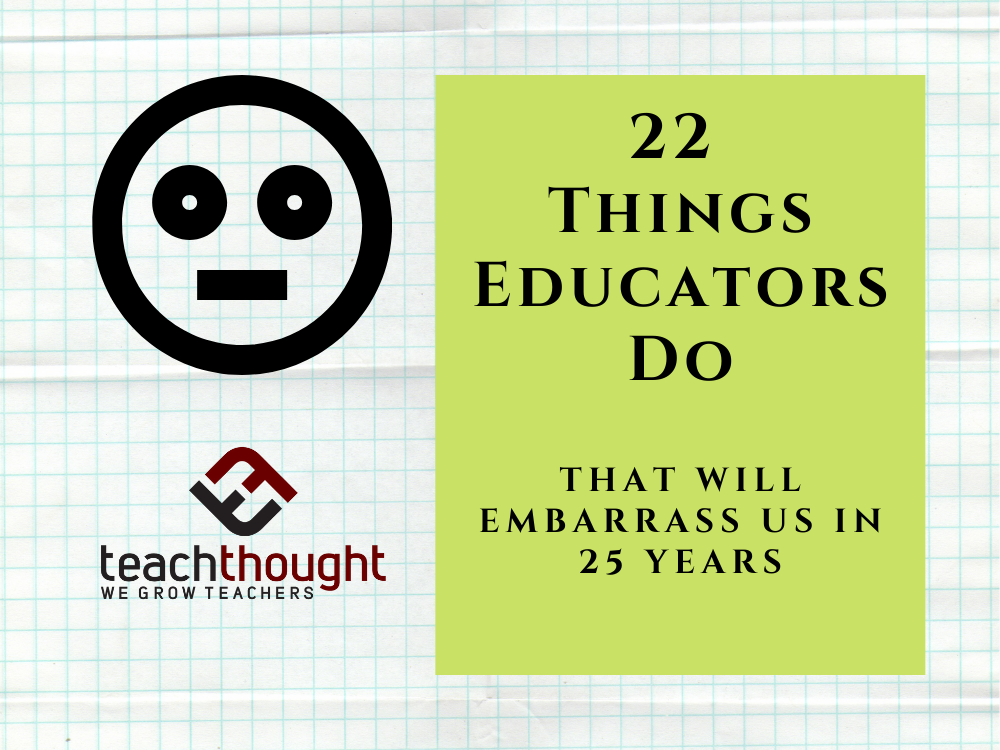
Things We Do As Educators That Will Embarrass Us In 25 Years
by Terry Heick
Saw a picture today from the 1970s of a mother driving her car with her newborn baby in the passenger seat (no car seat).
This, like pretty much everything else, got me thinking about education. What do we do now that in 25 years we’ll look back on and shake our heads? What are our “doctors smoking cigarettes while giving check-ups” moments? I have a feeling we’re going to look back and be really confused by quite a bit.
There’s probably a lot more than this, but I had to stop somewhere.
22 Things Educators Do That Will Embarrass Us In 25 Years
1. We separated literacy from content.
And were confused when we couldn’t properly untangle them.
2. Meter progress by grade levels.
Right now, progress through academia is incremental, like inches on a ruler. These increments are marked by “grade levels,” which really has no meaning other than the artificial one schools have given it in the most self-justifying, circular argument ever.
3. We frowned upon crowdsourced content (e.g., Wikipedia)
Even though it has more updates and cross-checks than more traditional sources of info. It’s not perfect, but it’s the future. Err, present.
4. We gave vacations.
Why do we feel the need to provide months off at a time from learning to read, write, and think? We made school so bad that students couldn’t stand to do it without “vacations”? We cleaved it so cleanly from their daily lives that they “stopped” learning for months at a time?
5. We closed off schools from communities.
Which was the first (of many) errors. Then we let the media report on school progress under terms so artificially binary that we ended up dancing to the drum of newspaper headlines and political pressure.
6. We made it clumsy and awkward for teachers to share curriculum.
Seriously. How is there no seamless, elegant, and mobile way to do this?
7. We turned content into standards.
This makes sense until you realize that, by design, the absolute best this system will yield is students that know content.
8. We were blinded by data, research, and strategies….
..so we couldn’t see the communities, emotions, and habits that really drive learning.
9. We measured mastery once.
At the end of the year in marathon testing. And somehow this made sense? And performance on these tests gave us data that informed the very structures our schools were iterated with over time? Seriously? And we wonder why we chased our tails?
10. We spent huge sums of money on professional development.
While countless free resources floated around us in the digital ether. Silly administrators.
11. We reported progress with report cards.
Hey, I’ve tried other ways and parents get confused and downright feisty. We did a poor job helping parents understand what grades really meant, and so they insisted on the formats they grew up with.
12. We banned early mobile technology (in this case, smartphones).
And did so for entirely non-academic reasons.
13. We shoehorned technology into dated learning models.
Like adding rockets to a tractor. Why did we not replace the tractor first?
14. We measured mastery with endless writing prompts and multiple-choice tests.
Which, while effective in spots, totally missed the brilliant students who, for whatever reason, never could shine on them.
15. We had parent conferences twice a year.
What? And still only had 15% of parents show up? And we didn’t completely freak out? We must’ve been really sleepy.
16. We ignored apprenticeships.
Apprenticeship is a powerful form of personalized learning that completely marries “content,” performance, craft, and communities. But try having a 900 apprentices in a school. So much for that.
17. We claimed to ‘teach students to think for themselves.’
Ha.
18. We often put 1000 or more students in the same school.
And couldn’t see how the learning could possibly become industrialized.
19. We frowned on lectures.
Even though that’s essentially what TED Talks are. Instead of making them engaging and interactive multimedia performances led by adults that love their content, we turned passionate teachers into clinical managers of systems and data.
20. We ignored social learning.
And got learning that was neither personal nor social. Curious.
21. We tacked on digital citizenship.
The definition of digital citizenship is “the quality of actions, habits, and consumption patterns that impact the ecology of digital content and communities.” This is artificial to teach outside of the way students use these tools and places on a daily basis–which makes hanging a “digital citizenship” poster or teaching a “digital citizenship” lesson insufficient.
Like literacy, it needs to be fully integrated into the learning experiences of students.
22. We turned to curriculum that was scripted and written by people thousands of miles away.
We panicked, and it was fool’s gold.
Bonus
23. We chewed educators up and spit them out
We made educators entirely responsible for planning, measuring, managing, and responding to both mastery and deficiency. And through peer pressure, a little brainwashing, and appealing to their pride, somehow convinced them they really were.
22 Things We Do As Educators That Will Embarrass Us In 25 Years; adatped image attribution flickr user vancouverfilmschool
